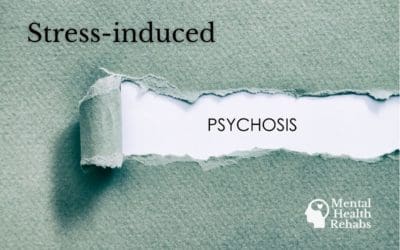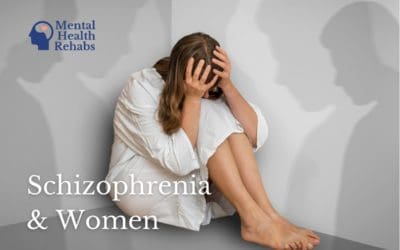Schizophrenia.

Understanding schizophrenia, recognizing its signs, and seeking professional treatment early are keys to the lifelong management of the illness.
What is schizophrenia?
Schizophrenia is a serious mental illness that affects how a person interprets the reality around them. It influences their feelings, thoughts, and behavior, causing frequent or continuous psychotic episodes.
People who have schizophrenia may look like they’ve lost touch with reality. The symptoms of schizophrenia can be debilitating, affecting the person’s ability to live normally and potentially leading to mental disability if not treated.
There’s no cure for schizophrenia, but effective treatments can allow one to be independent, work, and study.
Symptoms of schizophrenia
Schizophrenia’s best-known symptoms are those associated with psychosis, losing the sense of shared reality with those around them, and abnormally experiencing the world.
Common symptoms include:
- Delusions. Strong but irrational and untrue beliefs about themselves, those around them, and the world. Believing that others are out to harm them is common.
- Hallucinations. Hering, seeing, and feeling things that aren’t there. Hearing disembodied voices is very common.
- Disordered thinking. Finding it difficult to come up with rational and logical thoughts. Their speech may also be disordered.
- Abnormal body movements. Like obsessively repeating specific motions.
Violent behavior is not commonly associated with schizophrenia, despite the stigmas associated with debilitating mental illness.
Causes of schizophrenia
The exact cause of schizophrenia remains unknown. The most common contributing factors include a combination of genetic predisposition, brain chemistry, and environmental factors.
Genetic factors and family history
Schizophrenia tends to run in families. This doesn’t mean that every family member is at risk of developing schizophrenia, though. Researchers from the National Institute of Mental Health have identified 250 locations in the human genome that play a role in the risk of schizophrenia. Individual locations play minimal roles, but collectively they can increase the risk of suffering from the disease.
Brain chemistry and structure
Environmental factors
Diagnosis of schizophrenia
The primary source of criteria for diagnosing schizophrenia comes from the fifth edition of the Diagnostic and Statistical Manual of Mental Disorders (DSM-5), the most current edition of the DSM.
The main criteria for diagnosing schizophrenia is the presence of at least two of the following five items: delusions, hallucinations, disorganized speech, grossly disorganized or catatonic behavior, and negative symptoms.
The symptoms must be present for a “clinically significant portion of time” during one month. Continuous symptoms must persist for at least six months.
The DSM-5 also includes provisions for people who may suffer these symptoms due to drug use or have autism or a communication disorder.
The most common methods of diagnosing schizophrenia include:
- Blood tests to rule out substance abuse or interactions between medications.
Imaging studies like MRI and CT scans. - Physical exams to rule out other medical issues that could cause schizophrenia-like symptoms.
- Psychiatric evaluations. A mental health professional evaluates the patient by asking questions about their personal and family history, drug use history, thoughts, delusions, hallucinations, and potential suicidal ideas.
Treatment for schizophrenia
There’s no cure for schizophrenia, but there are effective treatment programs that help manage symptoms, function in day-to-day life, and achieve life goals.
Medication
Cognitive behavioral therapy (CBT)
Psychosocial treatment
Living with schizophrenia
People diagnosed with schizophrenia can experience an increased risk of mortality due to the risk of suicide, particularly those who also suffer from depression. However, treatment can help individuals lead healthy, meaningful, and productive lives with better outcomes.
Developing social and emotional coping strategies is crucial for managing schizophrenia, a lifelong illness without a cure. Some of the most common coping methods include the following:
- Getting enough sleep to prevent the onset of sleep deprivation-induced hallucinations.
- Exercising.
- Spending time outdoors.
- Journaling feelings and thoughts about psychotic symptoms.
- Taking medication as prescribed.
- Surrounding yourself with a robust support system of friends and family.
- Frequenting support groups for schizophrenia or severe mental illness.
- Using what you learned in therapy to manage negative emotions.
Finding Help for Schizophrenia
If you or a family member shows symptoms of psychosis, like hallucinations and delusions, it’s essential to seek help and support as soon as possible. Experts recognize early treatment for schizophrenia as extremely important for the long-term management of symptoms. It can make a significant difference in improving quality of life.
Related Conditions
- Bipolar Disorder
- Borderline Personality Disorder
- Substance Use Disorder
Related Articles
How Can Stress Cause Psychosis?
What isn’t stress responsible for these days? From premature wrinkles and gray hair to sleep, digestion, and heart problems there’s no shortage of how this sneaky and silent killer causes harm to our bodies. However, the effects of stress aren’t just limited to the...
Can Meditation Have Negative Side Effects in People with Schizophrenia
Ask anyone to name a few benefits of meditation and they’re sure to rattle off a laundry list of merits like improved concentration and focus, better sleep quality, better sex, lower stress, and greater overall happiness. Medical studies also praise the practice for...
Are Schizophernia Symptoms Different in Females?
The way schizophrenia presents itself can vary--sometimes drastically--depending on whether the affected individual is a man or a woman. As such, schizophrenia symptoms in females tend to be different from those of their male counterparts. This in turn means there are...
Don’t Struggle Alone.
Get Help Today.
Reaching out for help for yourself or a loved one can be overwhelming and stressful, but it doesn’t have to be. If you are struggling to find the right help, or even know where to get started, please feel free to call our 24/7 helpline.
Begin your mental health journey right now!




